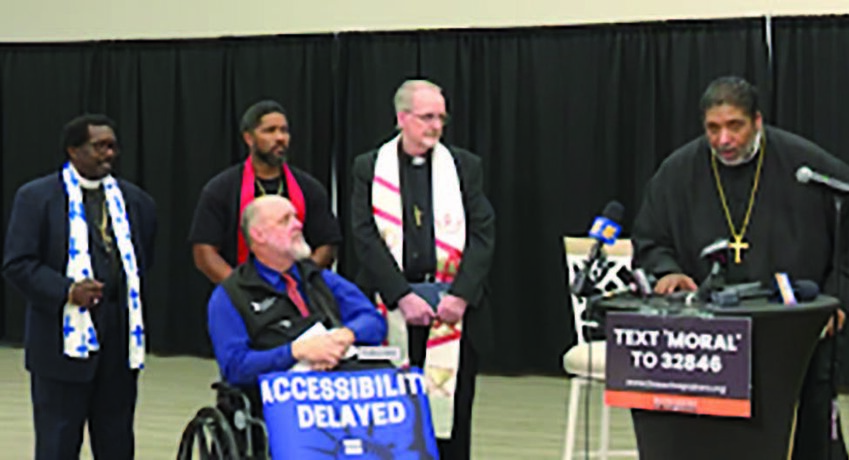 Bishop Barber champions plight of the disabled at a Dec. 29th Greenville press conference
Bishop Barber champions plight of the disabled at a Dec. 29th Greenville press conferenceThe special week was scheduled to end with Barber’s mother being presented with the Order of the Long Leaf Pine, the state’s highest citizen honor, for her many years of public service.
It was a trip to the movies, the new adaptation of Toni Morrison’s “The Color Purple,” that was a special Christmas gift for his mother. Bishop Barber deliberately chose the matinee’ show at the AMC Fire Tower 12 theater in Greenville so they would not have to contend with crowding.
But it didn’t matter.
Once Bishop Barber, a large man who walks with two canes, established himself with his requisite high seating chair in the handicapped area to watch the film with his mother, AMC Theater management determined that either the handicapped minister use the regular seating provided by the theater, or leave.
But the Christian minister can’t use a “regular” seat, he told them. It’s too low for the medical condition he suffers from. His special chair has accompanied him from the White House in Washington D.C. to the Vatican in Rome, Italy. Certainly anyone who has seen Bishop Barber over the past 20 years has seen him use his special chair without argument.
When Barber protested, informing management that his special seat is medically needed to help relieve a painful arthritic condition he’s had in his hips for 30 years, AMC theater management decided to call the police to have him forcibly removed if necessary.
AMC managers told the police Barber was refusing to cooperate with them, and thus, was trespassing.
Wisely, a cellphone camera captured the entire exchange once Greenville police supervisors arrived, and peaceably escorted Barber, his mother, and his aide who regularly carries the chair, out of the movie theater. On camera, Bishop Barber made sure he was clearly seen cooperating with the officers, and was heard declaring that he was nonviolent.
He even shook an officer’s hand.
“They called an officer of the law, the AMC theater in Greenville, North Carolina,” Barber said on camera. “They would not make amends to simply do the right thing. But we’ll deal with it.”
Barber indeed voluntarily, but reluctantly, left the theater with his understandably disturbed mother and aide, and from that moment, began an unexpected campaign to educate all about the rights of the physically and mentally disabled in this nation.
For many people, Bishop Barber’s AMC theater incident would be the first time they would hear about the ADA - the Americans with Disabilities Act - “…a federal civil rights law (passed in 1990) that prohibits discrimination against people with disabilities in everyday activities.”
In Bishop Barber’s case, he was specifically protected because, under federal law, “…to prevent discrimination against people with disabilities….that they encounter in everyday life….businesses that are open to the public …have to follow (certain) requirements of the ADA.”
The ADA is broken up into five different sections called “titles.”
Under ADA Title III, businesses serving the public, like restaurants, hotels, retail stores and movie theaters “…must provide people with disabilities an equal opportunity to access the goods and services that they offer.”
In Bishop Barber’s case, because he required the special high chair that he brought with him, AMC theater management could have helped him decide where it would have been best placed to not only ensure his safety and comfort while viewing the film with his mother, but the safety and comfort of audience members sitting around him.
Instead, they decided to violate the ADA, not even try to accommodate Barber, and called the police alleging that he was trespassing, even though he paid good money for his tickets. The police were never needed if AMC management knew the law.
Effectively, the AMC theater in Greenville violated Bishop Barber’s civil rights as a disabled American. The ADA did not require Barber to call ahead to notify the theater that he was coming, or what his needs might be. They were required serve him sight unseen as they would any other paying patron.
“As legally problematic as it is for the theater to refuse reasonable accommodation to a patron admitted to its grounds, it is amplified by the unnecessary indignity which Reverend Barber and his 90-year-old mother had to endure,” said Democratic gubernatorial candidate Mike Morgan, a former state associate justice of the N.C. Supreme Court, in a statement.
During his press conference in Greenville last Friday, Bishop Barber confirmed that the corporate head of the national AMC Theater chain, Chairman and CEO Adam Aron, did call him to apologize for the incident, assured him that the company had policies in place to accommodate the disabled, and hoped to meet with Barber to discuss that and other issues. That meeting reportedly took place January 2nd.
Barber told reporters Friday that his responsibility now is to advocate for the rights of other disabled people. His hope is that his efforts will “…lead to just and good things for those with disabilities.”
“Think about all the people in your family, your jobs, your churches, your community who are different … but just like you were created in the image of God,” Bishop Barber said. “This is about plain ol’ simple humanity.”